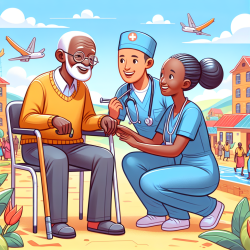Introduction
In recent years, the focus on transgender health within medical education has gained significant attention. The research article "Transgender Health in Medical Education" by Tommy Hana et al. highlights the critical need for integrating transgender health into medical curricula to address global health inequities. This blog aims to provide practitioners with insights into improving their skills by implementing the outcomes of this research or encouraging further exploration in this vital area.
Understanding Transgender Health
Transgender and gender-diverse individuals often face significant health disparities, including higher rates of mental health disorders, HIV infection, and barriers to accessing care. The article emphasizes the importance of gender-affirming care, which includes social, psychological, behavioral, and medical interventions designed to support an individual's gender identity. This care should be delivered with a person-centered, equity-based, and non-judgmental approach.
Incorporating Transgender Health into Medical Education
The research underscores the lack of transgender health topics in undergraduate and postgraduate medical education. It calls for comprehensive education that includes:
- Cultural Humility and Anti-Oppression Training: Understanding intersectionality and its impact on health outcomes is crucial for addressing inequities in transgender health.
- Involvement of Community Members: Engaging transgender and gender-diverse community members in curriculum development ensures that education initiatives are relevant and effective.
- Integration of Transgender Health: Transgender health should be a longitudinal component of medical curricula, covering both specific health needs and general care for transgender individuals.
- Practice-Focused and In Situ Training: Practical training through case-based learning and simulated consultations helps prepare practitioners to provide gender-affirming care.
- Staff Development: Training medical educators in transgender health is essential for effective curriculum delivery.
- Improving Access to Careers in Medicine: Encouraging transgender individuals to pursue medical careers can enhance trust and care quality within the healthcare system.
Encouraging Further Research and Practice
Practitioners are encouraged to delve deeper into the subject of transgender health by exploring additional research and resources. Engaging in continuous education and advocating for policy changes within healthcare institutions can lead to better health outcomes for transgender and gender-diverse individuals.
Conclusion
Integrating transgender health into medical education is a crucial step towards achieving health equity and ensuring that no one is left behind. By implementing the recommendations from the research article, practitioners can enhance their skills and contribute to a more inclusive and effective healthcare system.
To read the original research paper, please follow this link: Transgender health in medical education.










